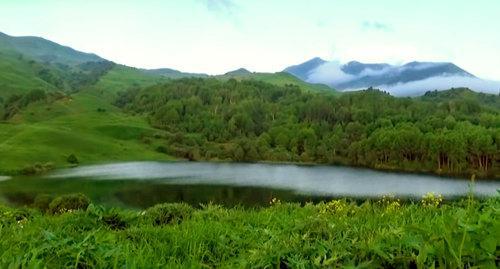
20 November 2018, 14:26
Residents of Chechnya treat mosque opening in Charmakh as start of village restoration
The mosque, opened on November 19 in the abandoned village of Charmakh, was the second mosque in eight days reconstructed in the Galanchozh District of Chechnya bordering on Ingushetia. Residents of Chechnya said that with the opening of the new mosque, they had faith appeared in the revival of villages in this territory.
The mosque in Charmakh was opened after reconstruction on November 19, a source from the Chechen Muftiate told the "Caucasian Knot" correspondent. The old mosque was built here back in 1900. "Builders have restored it to its original form," said the source.
The village of Charmakh remained abandoned since 1944; only the ruins of ancient towers and various buildings remain on the place of the village, an official from the Ministry of Culture of Chechnya told the "Caucasian Knot" correspondent.
According to his story, before the Stalin's deportation in 1944, there were 140 villages in the Galanchozh District with the population of over 10,000. After the Chechens' return from exile, residents of the district were not allowed to settle in their homeland, he has added.
The operation named "Chechevitsa" (Lentils), during which Chechens and Ingushes were massively evicted from the Chechen-Ingush Autonomous Soviet Socialist Republic to Central Asia and Kazakhstan, was conducted from February 23 to March 9, 1944. Because of the snowfall, residents of Khaibakh could not descend from the mountains, which disrupted the deportation schedule. The State Security Commissioner ordered to force villagers – according to various sources, from 200 to 700 people – into the stable and burn them down. Those who tried to escape were shot dead from submachine guns.
"Today, the Galanchozh District is practically abandoned; only ruins of villages remain there; there are no communications, even no normal roads, basically only old paths. It was hard to believe that the area would be restored, even when ... they started making a road there," Beslan, a native of the Galanchozh District, now living in Grozny, told the "Caucasian Knot" correspondent, adding that after the ancient mosque was reopened in Charmakh, where his ancestors lived, and for the first time they performed a collective namaz (prayer) there, he had a hope that people would return to the village. "Now I believe that our village will be revived, and the district, and that many people from the Galanchozh District will return there, and we'll revive our land," he said.
This article was originally published on the Russian page of 24/7 Internet agency ‘Caucasian Knot’ on November 20, 2018 at 10:49 am MSK. To access the full text of the article, click here.
Source: CK correspondent




